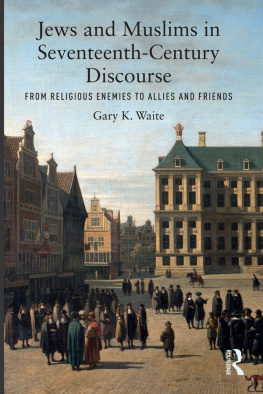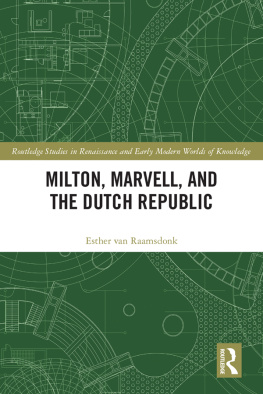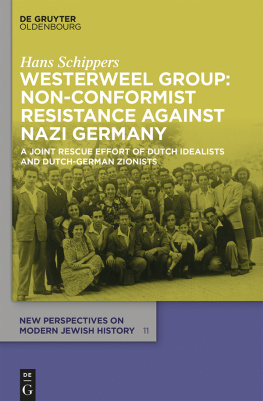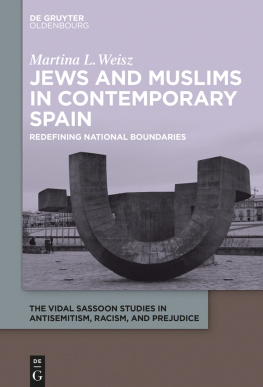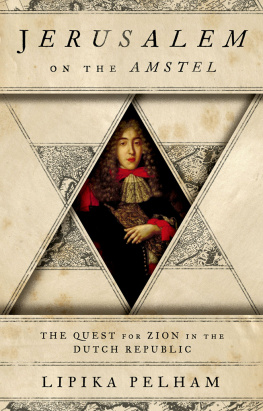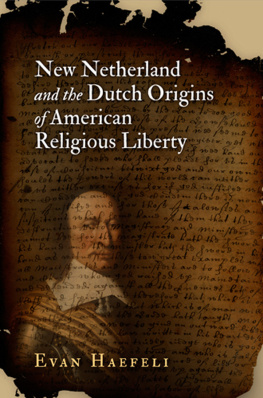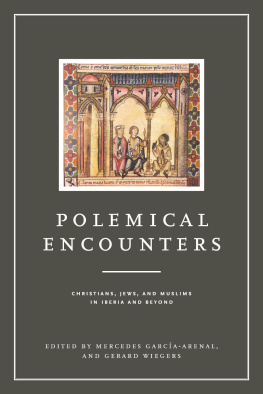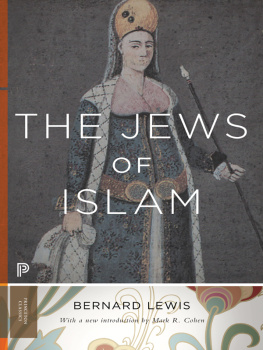Jews and Muslims in Seventeenth-Century Discourse
Jews and Muslims in Seventeenth-Century Discourse explores for the first time the extent to which the unusual religious diversity and tolerance of the Dutch Republic affected how its residents regarded Jews and Muslims.
Analyzing an array of vernacular publications, this book reveals how Dutch writers, especially those within the nonconformist and spiritualist camps, expressed positive attitudes toward religious diversity in general, and Jews and Muslims in particular. Through covering the Eighty Years War (15681648) and the post-war era, it also highlights how the Dutch search for allies against Spain led them to approach Muslim rulers. The Dutch were assisted in this by their positive relations with Jews, and were thus able to shape a more affirmative portrayal of Islam.
Revealing noticeable differences in language and tone between English and Dutch publications, and exploring societal attitudes and culture, Jews and Muslims in Seventeenth-Century Discourse is ideal for students of British and Dutch early-modern cultural, intellectual, and religious history.
Gary K. Waite is a professor of early-modern European history at the University of New Brunswick, Canada. He has published widely on religion, drama, and culture in the Low Countries, on Anabaptism and spiritualism, witchcraft and demonology, and is currently preoccupied with seventeenth-century Dutch religious nonconformists and the early Enlightenment.
First published 2019
by Routledge
2 Park Square, Milton Park, Abingdon, Oxon OX14 4RN
and by Routledge
711 Third Avenue, New York, NY 10017
Routledge is an imprint of the Taylor & Francis Group, an informa business
2019 Gary K. Waite
The right of Gary K. Waite to be identified as author of this work has been asserted by him in accordance with sections 77 and 78 of the Copyright, Designs and Patents Act 1988.
All rights reserved. No part of this book may be reprinted or reproduced or utilised in any form or by any electronic, mechanical, or other means, now known or hereafter invented, including photocopying and recording, or in any information storage or retrieval system, without permission in writing from the publishers.
Trademark notice: Product or corporate names may be trademarks or registered trademarks, and are used only for identification and explanation without intent to infringe.
British Library Cataloguing-in-Publication Data
A catalogue record for this book is available from the British Library
Library of Congress Cataloging-in-Publication Data
Names: Waite, Gary K., 1955 author.
Title: Jews and Muslims in seventeenth-century discourse : from religious
enemies to allies and friends / Gary K. Waite.
Description: Milton Park, Abingdon, Oxon ; New York, NY : Routledge, [2018] |
Includes bibliographical references and index.
Identifiers: LCCN 2018024854| ISBN 9780815363569 (hardback : alk. paper) |
ISBN 9780815363576 (pbk. : alk. paper) | ISBN 9781351108997 (ebook)
Subjects: LCSH: JewsNetherlandsHistory16th century. | Muslims
NetherlandsHistory16th century. | JewsNetherlandsHistory17th
century. | MuslimsNetherlandsHistory17th century. | JewsEngland
History. | MuslimsEnglandHistory. | Christianity and other religions
Islam. | IslamRelationsChristianity. | Christianity and other religions
Judaism. | JudaismRelationsChristianity. | NetherlandsEthnic relations. |
EnglandEthnic relations.
Classification: LCC DS135.N4 W364 2018 | DDC 305.6/970949209032dc23
LC record available at https://lccn.loc.gov/2018024854
ISBN: 978-0-8153-6356-9 (hbk)
ISBN: 978-0-8153-6357-6 (pbk)
ISBN: 978-1-351-10899-7 (ebk)
Typeset in Bembo
by Florence Production Ltd, Stoodleigh, Devon, UK
Dedicated to two darling granddaughters who arrived while I was working on this book and who have brought immeasurable joy to us all: Callie and Georgia Brown.
Despite decades of educational and legal efforts to suppress its expression, anti-Semitism remains a blight in the West and is growing within the Middle East. Also on the rise is Islamophobia. Both of these irrational sets of prejudices are based on conspiratorial modes of thought, and are hence extremely difficult to counteract with evidence and reason. They certainly give the lie to any remnant of the notion that history is somehow linear or progressive; while social and political conditions are very different from those that led to the Holocaust, anti-Semitic prejudices remain a danger that can lead to violence. Similarly, Islamophobia is leading in some places to restrictions in immigration or vigilante action, while reasoned debate is often shunned. Such conspiratorial ways of thinking remained dominant across early-modern Europe as epitomized in so much polemical literature and by the pogroms against Jewish communities or the notorious witch-hunts yet there were also individuals who sought to break the mold and to seek naturalistic explanations for disaster and to reconceptualise people different from themselves in less prejudicial ways. We will explore both ways of thinking in this book.
Thanks to my own situation I have been able to examine the subject of attitudes toward Jews and Muslims in the seventeenth century with a relative degree of calmness. I am a tenured professor who has received a great deal of support to pursue my research into attitudinal shifts in early-modern Europe. I have not experienced persecution or forced exile. Growing up in Toronto I lived near a Jewish neighbourhood and saw expressions of prejudice but also plenty of examples of people from diverse backgrounds getting along. While I went through a religious phase in my youth, my struggle to break free of that restrictive mindset helped shape my future research interests. It also provided me with an appreciation for the powerful hold that religion can have on people and how perspectives can be changed. I have thus been engaged for a long time in the fascinating study of religion in early-modern Europe. It is an incredibly important, yet often neglected, feature of Western culture, with effects both good and bad. This book is therefore the culmination of several decades of research and reflection.
The people who fill this book lived in an age when it was still possible to assume a common belief system based on Christian theology and values. Yet, some of those assumptions were increasingly being challenged, especially as the Reformation of the sixteenth century divided Europe into warring factions and new religious groups sprang up on a regular basis. Each of these interpreted scripture in ways divergent from the others, and the opportunity to compare and contrast such readings provided some of our writers with the ability to rethink and challenge many received ideas. Many of course refused to do so. The particular circumstances of the Dutch Republic, which turned almost overnight from vicious persecution of religious dissent to a realm promoting and defending freedom of conscience, provides us with an excellent opportunity to compare religious attitudes with neighbouring countries, such as England, and a test case for how old prejudices can be rethought and, in some cases, become a subject of ridicule.
I am very thankful that I have had the opportunity to pursue this research with so much support and encouragement, and to interact with so many helpful colleagues and students. While it sometimes feels like a lonely enterprise, researching and writing a scholarly book is the ultimate group exercise. It requires the assistance of archivists and librarians, conference audiences, friends and colleagues, anonymous readers of articles and of the book manuscript, and of course research funds that are vetted by scholarly colleagues whom I know to be very patient and supportive. It also requires time; time away from family and other pursuits, and sometimes from home. And, of course, it requires funding. I am therefore deeply grateful for the financial support that I have received from my home institution of the University of New Brunswick and from the Social Sciences and Humanities Research Council of Canada that awarded me a three-year research grant for the original project, blandly titled The religious Other in seventeenth-century Europe (20069). Without these funds it would have been impossible to conduct research in Amsterdam, Antwerp, and Cambridge, and very difficult to gather and analyse the dozens of pamphlets relevant to the subject. From 2006 to 2008 I was also a UNB University Research Scholar, which allowed me some extra time to pursue this research. I am also deeply appreciative of the assistance I have received at the archives and libraries I consulted, especially from the staff of my absolute favourite place to research, the Bijzondere Collecties, Universiteitsbibliotheek, Universiteit van Amsterdam. I am particularly thankful to Adriaan Plak for the many times he helped me find material and chatted with me about possible interpretations over a biertje or kopje koffie . I am also appreciative of the staff of another extraordinary library, that of the University of Cambridge, as well as of the Stadsarchief Antwerpen. I am grateful as well to Clare Hall, Cambridge, which granted me Life Fellow status in 2001 and at which Kate, Eleanor and I were able to reside for several weeks in 2008 while I completed research on this project. The president, fellows, staff, and graduate students there have created a truly inspiring environment in which to write. With the SSHRC funds I was also able to hire a research assistant, Ellen DeLange, who helped immensely in finding, digitizing, and organizing several dozen of the Dutch sources. And thanks also to Mike Driedger of Brock University for reading the manuscript at the very last minute and making several spectacularly helpful suggestions.

